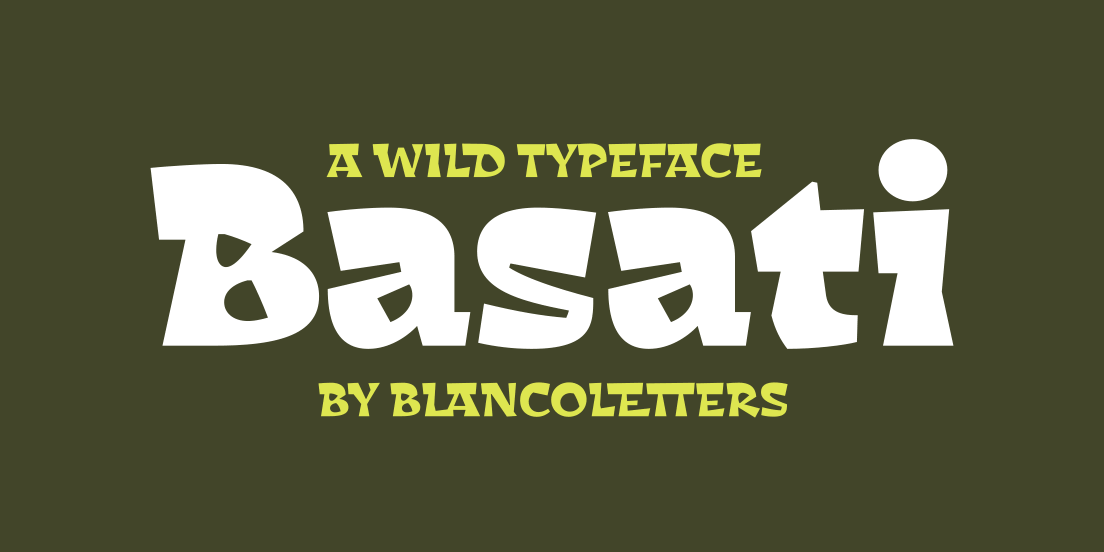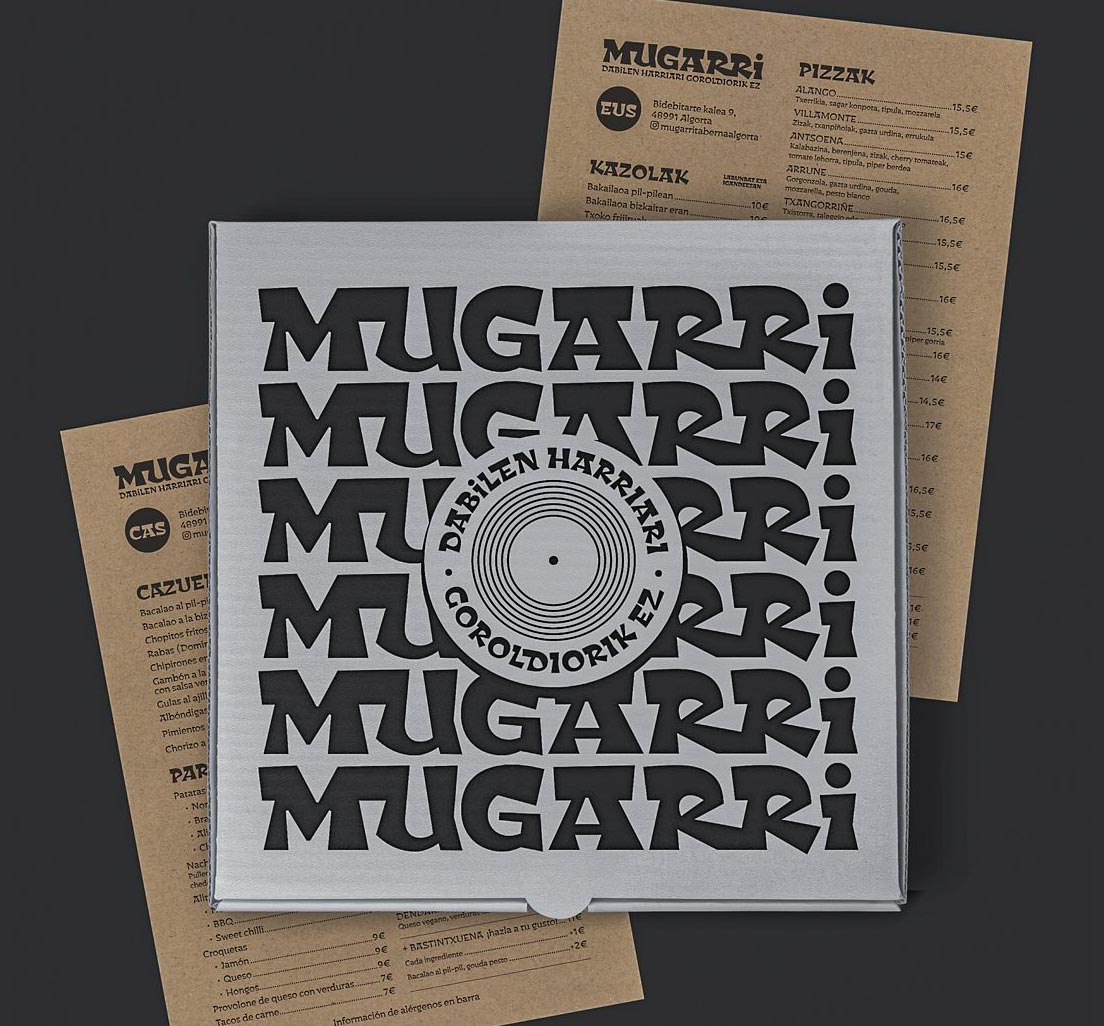Take advantage of the -60% discount till April 15th. Get single fonts for 3012€ or the complete family for 9036€
Basati
Basati -wild in Basque language- is a display typeface designed for headlines and hard-hitting messages. Its appearance is sharp, heavy and hard as an axe. But don’t be fooled by its rough and erratic look or the impression of having been carved with a machete. Each character is precise and sharp as a scalpel, and in that perfectly cut informality lies her deliberately wild temperament.
Perhaps because its design was conceived during a severe bout of lumbago, its strokes are heavy and provocative, as if trying to defy logic and gravity alike, placing the heaviest strokes in inconvenient/unconventional places, and doing so with the rage that sometimes overwhelms the wickedly ill.
The creation process began with the design of the black version, in which all possible resources are deployed to give it the typical powerful and provocative character of the Basque lettering style. The regular version is designed later in an exploratory exercise where the replication of the most characteristic features of the design is challenged by the scarcity of the material to shape them.




First released on 16th March 2023

Have a look at Basati Rounded for more choices! Grab the combo Basati + Basati Rounded together, and you’ll get a great discount plus Basati Variable for FREE
Basati: styles



Have a look at Basati Rounded for more choices! Grab the combo Basati + Basati Rounded together, and you’ll get a great discount plus Basati Variable for FREE
Basati: character set
Basati comes with 847 glyphs and supports 220+ languages.
If you do not find the character or glyph you need, please contact me and I will be happy to add it to the fonts.

Basati supports more than 200 languages:
Abenaki, Afaan, Oromo, Afar, Albanian, Alsatian, Amis, Anuta, Aragonese, Aranese, Aromanian, Arrernte, Arvanitic (Latin), Asturian, Atayal, Aymara, Azerbaijani, Bashkir (Latin), Basque, Belarusian (Latin), Bemba, Bikol, Bislama, Bosnian, Breton, Cape, Verdean, Creole, Catalan, Cebuano, Chamorro, Chavacano, Chichewa, Chickasaw, Cimbrian, Cofán, Corsican, Creek, Crimean Tatar (Latin), Croatian, Czech, Danish, Dawan, Delaware, Dholuo, Drehu, Dutch, English, Esperanto, Estonian, Faroese, Fijian, Filipino, Finnish, Folkspraak, French, Frisian, Friulian, Gagauz (Latin), Galician, Ganda, Genoese, German, Gikuyu, Gooniyandi, Guadeloupean, Creole, Gwich’in, Haitian Creole, Hän, Hawaiian, Hiligaynon, Hopi, Hotcąk (Latin), Hungarian, Ido, Ilocano, Indonesian, Interglossa, Interlingua, Irish, Istro-Romanian, Italian, Jamaican, Javanese (Latin), Jèrriais, Kala Lagaw Ya, Kapampangan (Latin), Kaqchikel, Karakalpak (Latin), Karelian (Latin), Kashubian, Kikongo, Kinyarwanda, Kiribati, Kirundi, Klingon, Kurdish (Latin), Ladin, Latin, Latino sine Flexione, Latvian, Lithuanian, Lojban, Lombard, Low Saxon, Luxembourgish, Maasai, Makhuwa, Malay, Maltese, Manx, Māori, Marquesan, Megleno-Romanian, Meriam Mir, Mirandese, Mohawk, Moldovan, Montagnais, Montenegrin, Murrinh-Patha, Nagamese, Creole, Ndebele, Neapolitan, Ngiyambaa, Niuean, Noongar, Norwegian, Novial, Occidental, Occitan, Oshiwambo, Ossetian (Latin), Palauan, Papiamento, Piedmontese, Polish, Portuguese, Potawatomi, Q’eqchi’, Quechua, Rarotongan, Romanian, Romansh, Rotokas, Sami (Inari Sami), Sami (Lule Sami), Sami (Northern Sami), Sami (Southern Sami), Samoan, Sango, Saramaccan, Sardinian, Scottish, Gaelic, Serbian (Latin), Seri, Seychellois Creole, Shawnee, Shona, Sicilian, Silesian, Slovak, Slovenian, Slovio (Latin), Somali, Sorbian (Lower Sorbian), Sorbian (Upper Sorbian), Sotho (Northern), Sotho (Southern), Spanish, Sranan, Sundanese (Latin), Swahili, Swazi, Swedish, Tagalog, Tahitian, Tamazight, Tetum, Tok Pisin, Tokelauan, Tongan, Tshiluba, Tsonga, Tswana, Tumbuka, Turkish, Turkmen (Latin), Tuvaluan, Tzotzil, Uzbek (Latin), Venetian, Vepsian, Volapük, Võro, Wallisian, Walloon, Waray-Waray, Warlpiri, Wayuu, Welsh, Wik-Mungkan, Wiradjuri, Wolof, Xavante, Xhosa, Yapese, Yindjibarndi, Zapotec, Zulu, Zuni.
Basati: features
Basati presents a wide range of Opentype features conceived mainly to build compact space-saving headlines
Basati is a display typeface with a strong personality, inspired -once again- by the traditional Basque lettering style. On this occasion, some of its more eccentric and idiosyncratic features are strengthened, and special emphasis is placed on its blatant informality and forcefulness. In this sense, there is a clear contrast with previous projects –Harri Display and Harri Text– in which standardization and refinement were the main goals. This fresh and unconstrained approach also seeks inspiration in some of the audacious interlacing and space-saving tricks used in inscriptions found in the Basque Country from the 17th century onwards. The result is a typeface with numerous variants, contextual alternates, ligatures, and interlocking groups of characters that confer great variability to the compositions.


Basati: in use




Basati font used in the packaging and menu of Mugarri restaurant, Getxo. Design by @lubakigrafik
Buying options
- Individual styles can be purchased from 30€.
- Basic bundle (3 styles): Regular, Bold & Black. From 60€
- Complete pack (5 styles): Regular, SemiBold, Bold, ExtraBold & Black. From 90€
Have a look at Basati Rounded for more choices!
Grab the combo Basati + Basati Rounded together, and you’ll get a great discount plus Basati Variable for FREE. Just want Basati Variable? Drop me a message via the contact form!
By downloading or installing the Font Software You agree on all the terms specified within the End User Licence Agreement.
Please fill up your details below:
You will recieve details of purchase along with the attached module in your PayPal email account.
If you do not have a Paypal account, please click the option “Don’t have a Paypal account?” in the Paypal page in order to pay with your credit card.
If you would rather pay by bank transfer, please contact us for further details on this option.
Warranties
- If you have issues or questions during installation or use, please contact us.
- Money back guarantee if you are not satisfied.


